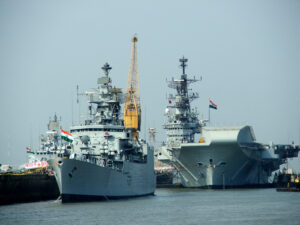The Indian Ocean is the world’s third-largest water body and the lifeblood of global trade, carrying nearly 80% of the world’s oil shipments and 40% of global trade. Yet, this bustling corridor faces persistent threats—piracy, drug smuggling, human trafficking, and other transnational maritime crimes.
At the forefront of defending these waters is the Indian Navy, which has positioned itself as a powerful net security provider, playing a pivotal role in protecting regional stability and global commerce. With a blend of cutting-edge technology, strategic partnerships, and unyielding commitment, the Indian Navy has developed a multi-pronged strategy to tackle piracy, disrupt organised smuggling networks, and address emerging maritime threats.
The Business of Piracy: A Persistent Menace
Piracy might no longer dominate global headlines, but its shadow looms large over critical maritime chokepoints like the Gulf of Aden and the Arabian Sea. These routes are vital arteries for global commerce, and their disruption poses economic risks that ripple across continents.
Since 2008, the Indian Navy has led anti-piracy patrols in the Gulf of Aden, safely escorting thousands of merchant ships through these treacherous waters. Maintaining a continuous presence has contributed to reclassifying high-risk zones, significantly reducing shipping insurance costs and enabling smoother trade. This proactive approach has made the Indian Navy a preferred partner for shipping companies and a reliable security force in an era of shifting global power dynamics.
Disrupting Smuggling Networks: A $27 Billion Problem
The Indian Ocean is also a conduit for lucrative drug-smuggling operations. In a single operation in November 2024, Indian naval assets intercepted a Myanmarese boat carrying 5.5 tonnes of methamphetamine—a haul valued at over ₹27,500 crore ($3.3 billion). This single seizure eclipses the annual budgets of major national programs, showcasing the sheer scale of the problem.
Smuggling operations, often backed by transnational criminal networks and anti-national entities, pose a direct threat to India’s domestic security. The proceeds from narcotics sales often fund terrorism and organised crime, amplifying the stakes for the Indian Navy. These operations are intelligence-driven and require meticulous coordination across multiple agencies. The Navy has built a robust framework for identifying and intercepting smuggling vessels by leveraging state-of-the-art maritime patrol aircraft, unmanned aerial vehicles, and warships equipped with real-time surveillance capabilities.
Inside the Navy’s Playbook: Tackling Maritime Crime

The Indian Navy employs a multi-layered strategy to address the full spectrum of maritime crime. Its approach can be broken down into four key components:
- Maritime Patrols and Escorts: Regular patrols in high-risk zones and deploying warships to escort merchant vessels ensure the uninterrupted flow of global trade.
- Maritime Intervention Operations (MIOs): The Navy’s elite MARCOS (Marine Commandos) and other Visit Board Search and Seizure (VBSS) personnel execute precision missions to board, inspect, and neutralise suspicious vessels. Their swift actions have rescued hijacked ships and disrupted smuggling attempts.
- Forward Deployment: By stationing warships at critical chokepoints like the Malacca Strait and the Persian Gulf, the Navy maintains a visible deterrent against piracy and smuggling.
- Global Partnerships: Membership in international coalitions such as the Combined Maritime Forces (CMF) has amplified the Navy’s reach. Initiatives like the Information Fusion Centre for the Indian Ocean Region (IFC-IOR) enhance real-time intelligence-sharing with allied nations.
The Economic and Geopolitical Stakes
The Indian Navy’s role in securing the Indian Ocean transcends the realm of security—it has significant economic and geopolitical implications. The Indian Ocean connects the economies of Asia, Africa, and the Middle East, making its stability essential for global markets. Any disruption in these waters could lead to skyrocketing shipping costs, energy insecurity, and cascading supply chain challenges.
India’s proactive maritime security efforts protect its trade routes and bolster its reputation as a regional leader. As a resident power in the Indian Ocean, India’s naval presence supports global energy supply chains. It ensures the smooth movement of goods—a critical factor in maintaining investor confidence and regional economic growth.
Challenges on the Horizon
Despite its successes, the Indian Navy faces evolving challenges. Maritime crime’s covert and transnational nature demands seamless intelligence-sharing and agency coordination. The 26/11 Mumbai attacks, which exploited gaps in India’s coastal security, highlighted the urgent need for integrated maritime surveillance and stronger coastal policing.
The Navy must continue investing in advanced technologies, expand its operational footprint, and foster deeper partnerships with regional and global stakeholders. Strengthening the interoperability of naval assets with allied forces will be crucial in countering increasingly sophisticated maritime threats.
Charting a Course for Maritime Leadership
The Indian Navy has emerged as a powerful guardian of the high seas, blending operational excellence with strategic foresight. From dismantling smuggling networks to deterring piracy, its actions underpin the security of one of the world’s most vital maritime domains.
As India continues its ascent as a global economic powerhouse, the Navy’s role as a net security provider will become even more critical. With its eyes firmly on the horizon, the Indian Navy sets a benchmark for maritime security, ensuring that the high seas remain a realm of opportunity, not threat, for the international community.
Author

Aritra Banerjee is a Defence, Foreign Affairs & Aerospace Journalist, Co-Author of the book ‘The Indian Navy @75: Reminiscing the Voyage’ and was the Co-Founder of Mission Victory India (MVI), a new-age military reforms think-tank. He has worked in TV, Print and Digital media, and has been a columnist writing on strategic affairs for national and international publications. His reporting career has seen him covering major Security and Aviation events in Europe and travelling across Kashmir conflict zones. Twitter: @Aritrabanned















